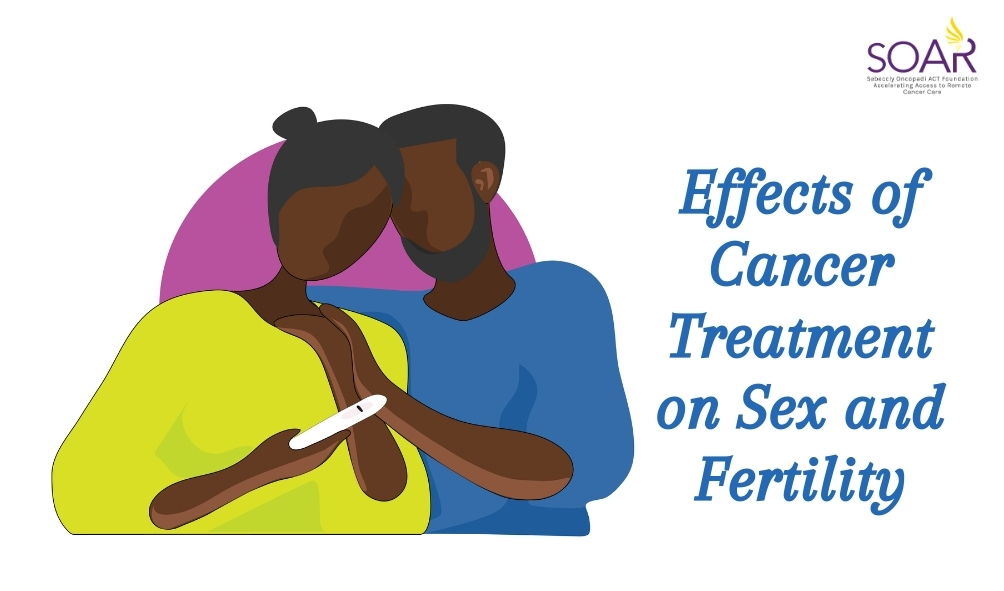Cancer and cancer treatment can take a significant toll on the body. People experience changes in their energy level, weight, bodies, and changes in their sexual functioning.
Sexual dysfunction is a normal part of cancer treatment. It affects not less than half of the patients treated for pelvic tumours and more than a quarter of people with other types of cancer. The problems are generally related to damage to the nerves, blood vessels, and hormones that underlie normal sexual function. Sexual dysfunction can also be associated with anxiety, depression, relationship conflict, and loss of self-esteem.
Many women go through different types of sexual functioning changes depending on their age, type of cancer, and treatment approach.
Some of the most common concerns men may experience are: difficulty getting or maintaining an erection, changes in ejaculation or orgasm, or decreased desire.
CHEMOTHERAPY
Chemotherapy certainly has many side effects, including those that are sexual. The libido or the desire for sexual activity decreases when one is undergoing chemotherapy. This is mainly because they just don’t feel good that they’re sick. There are no consequences of engaging in sexual activity while undergoing chemotherapy; however, there are some more significant side effects.
For example, when one loses her hair, it’s not just on the top of the head, it’s total body hair loss, so any genital or pubic hair is likely to be lost. It may come out in small amounts or come out in clumps, but almost invariably, if your chemotherapeutic drug causes hair loss, it will cause hair loss in the genital areas.
There are problems with infertility that are usually temporary with chemotherapy drugs, although it can be permanent in females because of chemotherapy affecting those rapidly dividing cells that aid fertility. It can also affect the rapidly dividing cells inside the vaginal mucosa or the lining inside the vagina, which is likely to cause some pain during intercourse.
With radiation, fertility is at risk as well. If radiation is to the pelvis, where our reproductive organs are, that can affect fertility.
Effects Of Chemotherapy on Women and Fertility
Chemotherapy can lower the hormone level in the ovaries.
How does this happen?
Hormones like estrogen are produced in the ovaries’ cells and are needed every month to free eggs and get the uterus ready for pregnancy.
Now, the oocytes are rapidly dividing cells and are unfortunately targeted by chemotherapy. (Chemo isn’t well defined in the body. It tends to affect any rapidly dividing cell as it believes they’re cancer cells). This can lead to the loss of these important hormones and impair fertility. Sometimes, a woman will go through menopause early or have a premature birth.
In some women, periods during chemotherapy become irregular but return to normal after treatment. In other women, chemotherapy can completely stop menstruation (menopause).
Fertility depends on a woman’s stage of life (before or after puberty, before or after menopause), the menstrual history, hormone levels, the type of tumour, and the treatment and treatment doses. Because all of these factors need to be considered, it can be difficult to predict whether a woman can be fertile after chemotherapy.
Even if the menstrual cycle stops during chemotherapy, a woman can still produce eggs and become pregnant. However, Chemotherapy drugs can harm the baby, so it is best to continue using a reliable contraceptive. The doctor should discuss this with the patient.
Effects of Chemotherapy on Men’s Sexuality
Certain cancer drugs can reduce the libido of some men for a while due to fatigue or other side effects. The libido will return to normal immediately after treatment. Some drugs can also affect the genital nerves. Hormonal therapies can lower your sex drive. This can make it difficult to get or maintain an erection. This is usually temporary and gradually improves at the end of treatment. They may also experience swelling and tenderness of the breast.
Some types of chemotherapy reduce the amount of male hormone (testosterone) produced by the testes. This returns to normal after the end of treatment as well.
Most men can still have an erection and orgasm as before treatment. Chemotherapy drugs generally do not have a lasting effect on sexual performance or pleasure.
It is important to use contraception during treatment. You should avoid having a baby during chemotherapy, as the medicine can harm the developing baby.
Cancer and Birth Defects
Sometimes cancer treatment does not affect fertility, but birth defect problems can occur if a woman becomes pregnant during or after treatment. Studies show that there is a risk of birth defects when pregnant during or after chemotherapy, hormone therapy, and radiation treatments. In some cases, the risk may persist, making pregnancy a problem for several years, even after treatment. Women are usually not recommended to become pregnant during treatment. It can be said that depending on the treatment and the situation, it is better to shift pregnancy to later years.
When a man is the father of the child during or after treatment, the risk of birth defects is not so clear. However, as we mentioned earlier, using contraception during treatment is highly recommended, and try not to have a child during treatment.
Conclusion
You may have fertility problems during treatment or notice changes in your body that you think may affect your ability to have children after treatment. It is important to speak to your health-care team at the beginning of the treatment phase. Or if you didn’t talk about fertility before the surgery or treatment, you can talk about it when you go to the doctor, even if the doctor or nurse didn’t introduce it. Involve your partner if you feel comfortable with it. Remember, if your health care team doesn’t know the problem you have, they cannot help you fix it.

